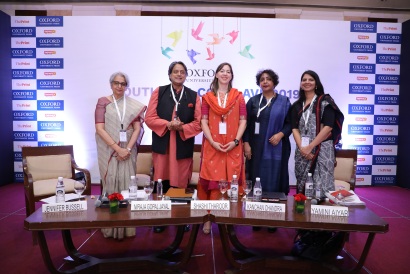(New Delhi, Jul 7, 2019) Skill coaches, who have authored books, are gradually gaining popularity in helping improve personal and professional lives, be it in life, sports or business.
According to these writers, coaching is a natural extension to the expression of their ideas, stories and beliefs.
“Seeing your coachee reach his or her goal, makes it all worthwhile”, says Jaykumar Hariharan, author of “Rewire: How to be the Leader of your own Life” (Leadstart) and an internationally certified professional coach who has been coaching senior leaders in organisations across India, South East Asia and the US for many years.
“I have had the privilege of working with more than 100 CXO’s and logging more than 2,000 hours of coaching across industry spaces such as information technology, automobiles, banking and financial services, consulting, oil and gas, pharmaceuticals, venture capital etc,” he adds.
Runjhun Noopur, another coach who wrote “Nirvana in a Corporate Suit” (TreeShade Books), a hilarious take on corporate life, says, “Being an ex-corporate lawyer and having a spiritual bent of mind inspired me to take up training and coaching as a means to facilitate and identify ways we could be happier in our personal and professional spaces.”
Noopur, who is out with her debut book and has written articles in various newspapers and magazines, says, “Even before I took to training and coaching as a career, I was writing for spiritual and wellness columns like the ‘Speaking Tree’ (the Times of India). In a way, my writing allowed me to explore my ideas and develop them into something profound and conscious, but at the same time practical and applicable.”
Writing, she says, is a kind of meditation that has connected her with her consciousness which in turn gave her the tools and the confidence to take up training and coaching.
For Hariharan, on the other hand, writing was a natural extension of the creative process of putting ideas and frameworks down. His book “Rewire” touches upon key subjects of corporate culture and how leaders can sail through conflicts keeping this healthy culture intact, highlighting the need to laugh to lead better, with the help of interesting anecdotes and case studies.
Vocalist, writer and trainer Rashmi Joshi, whose book “Here and Beyond” (Bloomsbury) deals with handling depression and fighting abuse, decided to quit her corporate career as a human resource professional early in life.
She has been coaching corporates, institutes and groups since, on the potential and ability of the human brain to rewire and reboot at will with some practical exercises followed by a ‘self-awareness meditation’ that help recognise the afflictions and do away with them.
There are also many writers who take up professional coaching of groups and corporates on skills they excel in, as a parallel profession.
S Venkatesh, a business leader, investor, entrepreneur and author of “Kaalkoot: The Lost Himalayan Secret” (TreeShade Books) shares that in his over two decades-long career, he pursued a parallel inner journey of mindfulness and unlocking his creativity.
“My inner journey in unlocking creativity helps me inspire others to embark on a fascinating journey of personal growth and transformation. Through workshops and coaching sessions, I help CXOs, business leaders and entrepreneurs unlock their creativity, achieve personal growth and transformation, and become more effective leaders.”
Young adult and children’s writer and advertising professional Neera Maini Srivastav says coaching is more a predisposition than a formal career.
Her most recent book “150 Brilliant Ideas to Keep Young Minds Fit and Fine” (Pustak Mahal) talks about holistic wellness to fight increasing issues of obesity and depression in young.
On her module on writing and its therapeutic benefits, Srivastav says, “Writing apart from being an artistic activity is also therapeutic. And it works irrespective of whether you are conscious of it or not. Every time I write, I express some emotion or feeling and it is cathartic.”
Noopur, who also conducts sessions for academic institutions including undergraduate colleges and schools apart from corporate, resonates with Srivastav.
“One cannot become a coach unless they have spent time with themselves and explored their own consciousness, values and spiritual contours. And for me, writing was a tool to do all that and more.”
For Venkatesh, storytelling is a very powerful medium of communication, and is a great tool for inspiring people to grow and transform.
Hariharan too has an entire chapter dedicated to the art and importance of storytelling especially for leaders, in “Rewire”. He feels writing a book enables him to set a sense of his coaching voice among his coachees.
For a writer coaching also provides for more content. “Each time I coach, I learn a new facet of human behaviour, which in turn, is like fodder for my ‘forever hungry’ brain,” says Joshi.
Many years ago, celebrated writer and speaker Devdutt Pattanaik had brought together mythology and governance in his writing and public and corporate talks on the relevance of mythology in modern times, especially in areas of management, governance and leadership.
Today this has taken shape of a full-fledged profession for many writers where some charge as high as Rs 75,000 per session, given the emerging need for being able to provide a new meaning to the professional and personal lives of thousands of Indians and help them achieve success in what they do with both.
